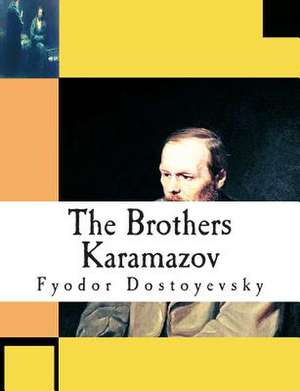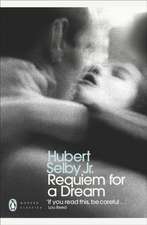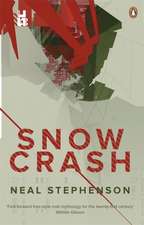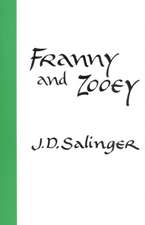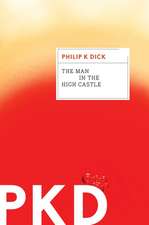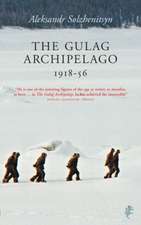The Brothers Karamazov
Autor Fyodor Dostoyevsky Ilustrat de Murat Ukray Traducere de Constance Garnetten Limba Engleză Paperback
| Toate formatele și edițiile | Preț | Express |
|---|---|---|
| Paperback (17) | 54.00 lei 3-5 săpt. | +15.70 lei 7-13 zile |
| Signet Classics – 30 noi 2007 | 54.00 lei 3-5 săpt. | +15.70 lei 7-13 zile |
| Penguin Books – 26 feb 2003 | 69.21 lei 3-5 săpt. | +29.80 lei 7-13 zile |
| Dover Publications – 31 iul 2005 | 71.80 lei 3-4 săpt. | +32.79 lei 7-13 zile |
| CreateSpace Independent Publishing Platform – | 106.42 lei 3-5 săpt. | |
| Les Prairies Numeriques – 3 aug 2020 | 182.66 lei 3-5 săpt. | |
| – | 193.79 lei 3-5 săpt. | |
| Rupa Publications India Pvt Ltd. – 30 sep 2013 | 213.60 lei 3-5 săpt. | +37.13 lei 7-13 zile |
| CreateSpace Independent Publishing Platform – | 164.96 lei 6-8 săpt. | |
| Digireads.com – apr 2019 | 188.84 lei 6-8 săpt. | |
| SMK Books – 21 mar 2012 | 210.24 lei 6-8 săpt. | |
| Bottom of the Hill Publishing – 30 sep 2014 | 217.26 lei 6-8 săpt. | |
| SC Active Business Development SRL – 29 noi 2017 | 257.20 lei 38-44 zile | |
| Echo Library – 25 feb 2019 | 288.77 lei 38-44 zile | |
| CreateSpace Independent Publishing Platform – | 318.22 lei 6-8 săpt. | |
| Alpha Editions – 13 aug 2020 | 331.20 lei 6-8 săpt. | |
| Simon & Brown – 28 oct 2018 | 353.59 lei 38-44 zile | |
| Simon & Brown – 14 noi 2018 | 387.24 lei 38-44 zile | |
| Hardback (7) | 167.53 lei 3-5 săpt. | +40.85 lei 7-13 zile |
| Penguin Books – 4 ian 2024 | 167.53 lei 3-5 săpt. | +40.85 lei 7-13 zile |
| Prince Classics – 18 mai 2019 | 290.31 lei 38-44 zile | |
| Throne Classics – 11 iun 2019 | 290.31 lei 38-44 zile | |
| SMK Books – 3 apr 2018 | 305.95 lei 6-8 săpt. | |
| Alpha Editions – 13 aug 2020 | 391.82 lei 6-8 săpt. | |
| Simon & Brown – 27 oct 2018 | 407.46 lei 38-44 zile | |
| Simon & Brown – 14 noi 2018 | 430.79 lei 38-44 zile |
Preț: 346.87 lei
Nou
Puncte Express: 520
Preț estimativ în valută:
66.37€ • 69.30$ • 54.93£
66.37€ • 69.30$ • 54.93£
Carte indisponibilă temporar
Doresc să fiu notificat când acest titlu va fi disponibil:
Se trimite...
Preluare comenzi: 021 569.72.76
Specificații
ISBN-13: 9781502426215
ISBN-10: 1502426218
Pagini: 820
Dimensiuni: 189 x 246 x 41 mm
Greutate: 1.44 kg
Editura: CreateSpace Independent Publishing Platform
ISBN-10: 1502426218
Pagini: 820
Dimensiuni: 189 x 246 x 41 mm
Greutate: 1.44 kg
Editura: CreateSpace Independent Publishing Platform
Notă biografică
Fyodor Mikhailovich Dostoevsky[a] (11 November 1821 - 9 February 1881), sometimes transliterated Dostoyevsky, was a Russian novelist, short story writer, essayist, journalist and philosopher. Dostoevsky's literary works explore human psychology in the troubled political, social, and spiritual atmospheres of 19th-century Russia, and engage with a variety of philosophical and religious themes. His most acclaimed works include Crime and Punishment (1866), The Idiot (1869), Demons (1872), and The Brothers Karamazov (1880). Dostoevsky's body of works consists of 11 novels, three novellas, 17 short stories, and numerous other works. Many literary critics rate him as one of the greatest psychologists in world literature.[3] His 1864 novella Notes from Underground is considered to be one of the first works of existentialist literature. Born in Moscow in 1821, Dostoevsky was introduced to literature at an early age through fairy tales and legends, and through books by Russian and foreign authors. His mother died in 1837 when he was 15, and around the same time, he left school to enter the Nikolayev Military Engineering Institute. After graduating, he worked as an engineer and briefly enjoyed a lavish lifestyle, translating books to earn extra money. In the mid-1840s he wrote his first novel, Poor Folk, which gained him entry into St. Petersburg's literary circles. Arrested in 1849 for belonging to a literary group that discussed banned books critical of Tsarist Russia, he was sentenced to death but the sentence was commuted at the last moment. He spent four years in a Siberian prison camp, followed by six years of compulsory military service in exile. In the following years, Dostoevsky worked as a journalist, publishing and editing several magazines of his own and later A Writer's Diary, a collection of his writings. He began to travel around western Europe and developed a gambling addiction, which led to financial hardship. For a time, he had to beg for money, but he eventually became one of the most widely read and highly regarded Russian writers.
Descriere
Descriere de la o altă ediție sau format:
'The most magnificent novel ever written' Sigmund Freud
The murder of brutal landowner Fyodor Karamazov changes the lives of his sons irrevocably: Mitya, the sensualist, whose bitter rivalry with his father immediately places him under suspicion for parricide; Ivan, the intellectual, driven to breakdown; the spiritual Alyosha, who tries to heal the family's rifts; and the shadowy figure of their bastard half-brother, Smerdyakov. Dostoyevsky's dark masterwork evokes a world where the lines between innocence and corruption, good and evil, blur, and everyone's faith in humanity is tested.
Translated with an Introduction and notes by DAVID McDUFF
Cuprins
The Brothers KaramazovChronology
Introduction
Further Reading
A Note on the Text
The Brothers Karamazov
Notes
Textul de pe ultima copertă
Completed only two months before his death, The Brothers Karamazov is Dostoyevsky's largest, most expanisve, most life-embracing work. Filled with human passions lust, greed, love, jealousy, sorrow and humor the book is also infused with moral issues and the issue of collective guilt. As in many of Dostoyevsky's novels, the plot centers on a murder. Sucked into the crime's vortex are three brothers: Dmitri, a young officer utterly unrestrained in love, hatred, jealousy, and generosity; Ivan, an intellectual capable of delivering, impromptu, the most brilliant, lively, and unforgettable disquisitions about good and evil, God, and the devil; and Alyosha, the youngest brother, preternaturally patient, good, and loving.
Part mystery, part profound philosophical and theological debate, The Brothers Karamazov pulls the reader in on many different levels. As the Introduction says, "The characters Dostoyevsky writes about, though they may not appear to be ones who live on our street, or even on any street, seem, in their passions and lack of self-control, the familiar and intimate denizens of our souls." It's no wonder that for many people The Brothers Karamazov is one of the greatest novels ever written.
Dover (2005) unabridged publication of the Constance Garnett translation as published by W. Heinemann, London, 1912-1920."
Part mystery, part profound philosophical and theological debate, The Brothers Karamazov pulls the reader in on many different levels. As the Introduction says, "The characters Dostoyevsky writes about, though they may not appear to be ones who live on our street, or even on any street, seem, in their passions and lack of self-control, the familiar and intimate denizens of our souls." It's no wonder that for many people The Brothers Karamazov is one of the greatest novels ever written.
Dover (2005) unabridged publication of the Constance Garnett translation as published by W. Heinemann, London, 1912-1920."
